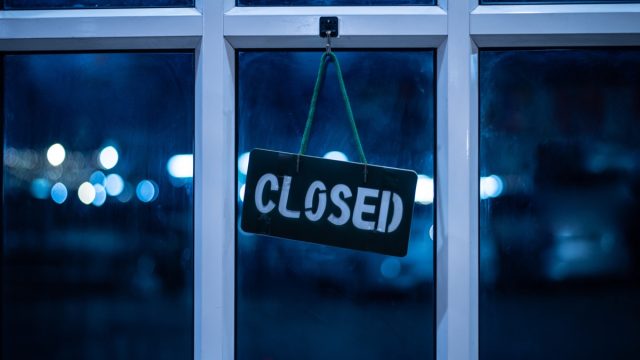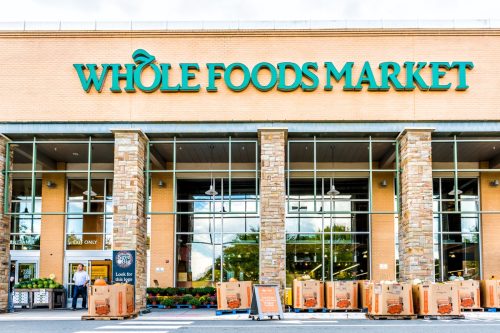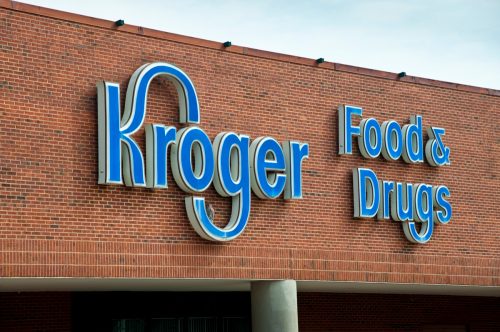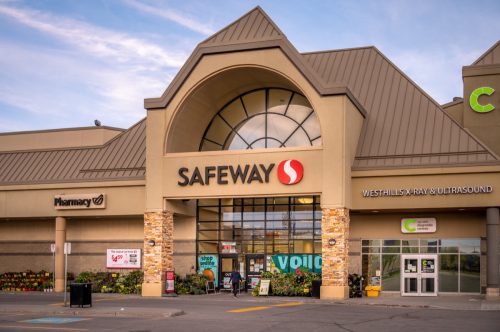This Popular Grocery Chain Is Closing Stores in December—And More May Be Coming

Chances are, there are a few different grocery stores where you live—but, as with many things in life, you probably have a favorite one to shop at. Maybe it has the best produce selection or a nice array of baked goods, or maybe you’ve just forged a special relationship with the employees. With that in mind, saying goodbye to your preferred supermarket can be both inconvenient and upsetting. Now, one popular grocery chain announced that it’s closing locations, with the potential for many more closures to come. Read on to find out which chain is shutting down stores starting in December.
READ THIS NEXT: These Popular Grocery Chains Are Closing Stores, Starting Nov. 11.
Grocery stores have been going at an alarming rate.

These aren’t the first grocery stores to be on the chopping block this year, and no region of the U.S. has been immune. A Shaw’s grocery store in Scarborough, Maine, was set to close “on or around” Oct. 8 due to profit shortfalls, a spokesperson told Best Life, and on Oct. 14, regional grocery chain Remke Markets shuttered a store in Hyde Park Plaza in Oakley, Ohio. Connecticut residents will say goodbye to a ShopRite in Waterbury, Connecticut, on Nov. 11, while those in Englewood, Illinois will lose a Whole Foods on Nov. 13. Later this year, on Dec. 30, Giant Eagle will also close up shop in Edinboro, Pennsylvania.
Now, the nation’s largest supermarket chain has announced another set of closures.
These locations are on the chopping block.

Kroger operates nearly 2,800 stores—under 28 different names—in 35 states, but a select few are shuttering for good. A store in New Albany, Indiana just closed on Oct. 7, as it “struggled to be profitable for many years,” a spokesperson told the Louisville Courier Journal in September. And now, two more locations are being shut down.
On Oct. 14, Kroger confirmed that two stores in the Metro Atlanta area are being shut down, Fox 5 Atlanta reported. The Kroger on Commerce Drive in Decatur is the first to go on Dec. 2, closing due to “declining sales and negative profit,” the grocery chain told Fox 5. The location was called “Baby Kroger” by locals, according to Atlanta Intown, due to its smaller size compared to other Kroger stores.
The Kroger in Buckhead, a residential district in Atlanta, will be shuttered a week later on Dec. 9. This store also had a nickname—”Disco Kroger”—as it previously neighbored Limelight, a disco and nightclub, according to 11Alive. Citing the Atlanta Business Chronicle, the outlet reported that a new grocery store will likely replace Disco Kroger, but the beloved disco-themed mural on the side of the building will be preserved.
While these quirky Krogers are the next to go, they might not be the last.
RELATED: For more up-to-date information, sign up for our daily newsletter.
Kroger has plans for a merger.

Kroger is the largest supermarket chain in the U.S., just ahead of Albertsons, but the two don’t want to stay separate for long. On Oct. 14, the two companies announced a merger agreement, where Kroger will purchase Albertsons for a whopping $24.6 billion. Albertsons has 24 different store banners—you might recognize them as Acme, Vons, Safeway, Jewel-Osco, and Shaw’s.
According to the press release, the deal was unanimously approved by both companies’ boards of directors and established to “merge two complementary organizations with iconic brands and deep roots in their local communities to establish a national footprint.” The two grocers were likely motivated by the ability to save on operating costs, according to The New York Times, while also increasing competition with Walmart.
The merger is expected to cause a bit of a stir, NPR reported, primarily with regulators like the Federal Trade Commission (FTC). This is largely due to the formation of a “new supermarket colossus at the time of soaring food costs,” according to the outlet. But while regulators may take issue with the deal, shoppers might be affected by a loss of local stores.
The deal could force hundreds of store closures.

According to PYMNTS, to minimize criticism of the merger and prevent a monopoly, Kroger and Albertsons may be forced to close nearly 400 locations. This could largely impact the West Coast, where both Kroger and Albertsons have a large presence, per The New York Times. To further allay scrutiny, the companies also said that they are open to establishing a separate company with 100 to 375 stores, in an effort to “create a new, agile competitor.”
But even if 400 stores are axed or sold to competitors, J.P. Morgan analyst Ken Goldman notes that the companies would still control 13 percent of the grocery market, PYMNTS reported. In light of these figures, some have already voiced opposition to the deal.
“There is no reason to allow two of the biggest supermarket chains in the country to merge—especially with food prices already soaring,” Sara Miller, executive director of the American Economic Liberties Project, said in a press release. “With 60% of grocery sales concentrated among just 5 national chains, a Kroger-Albertsons deal would squeeze consumers already struggling to afford food, crush workers fighting for fair wages, and destroy independent, community stores. This merger is a cut and dry case of monopoly power, and enforcers should block it.”
Regulatory approval is currently pending, The New York Times reported. Before making a decision the FTC will consider previous deals, as well as whether competition will still exist after they sell stores.